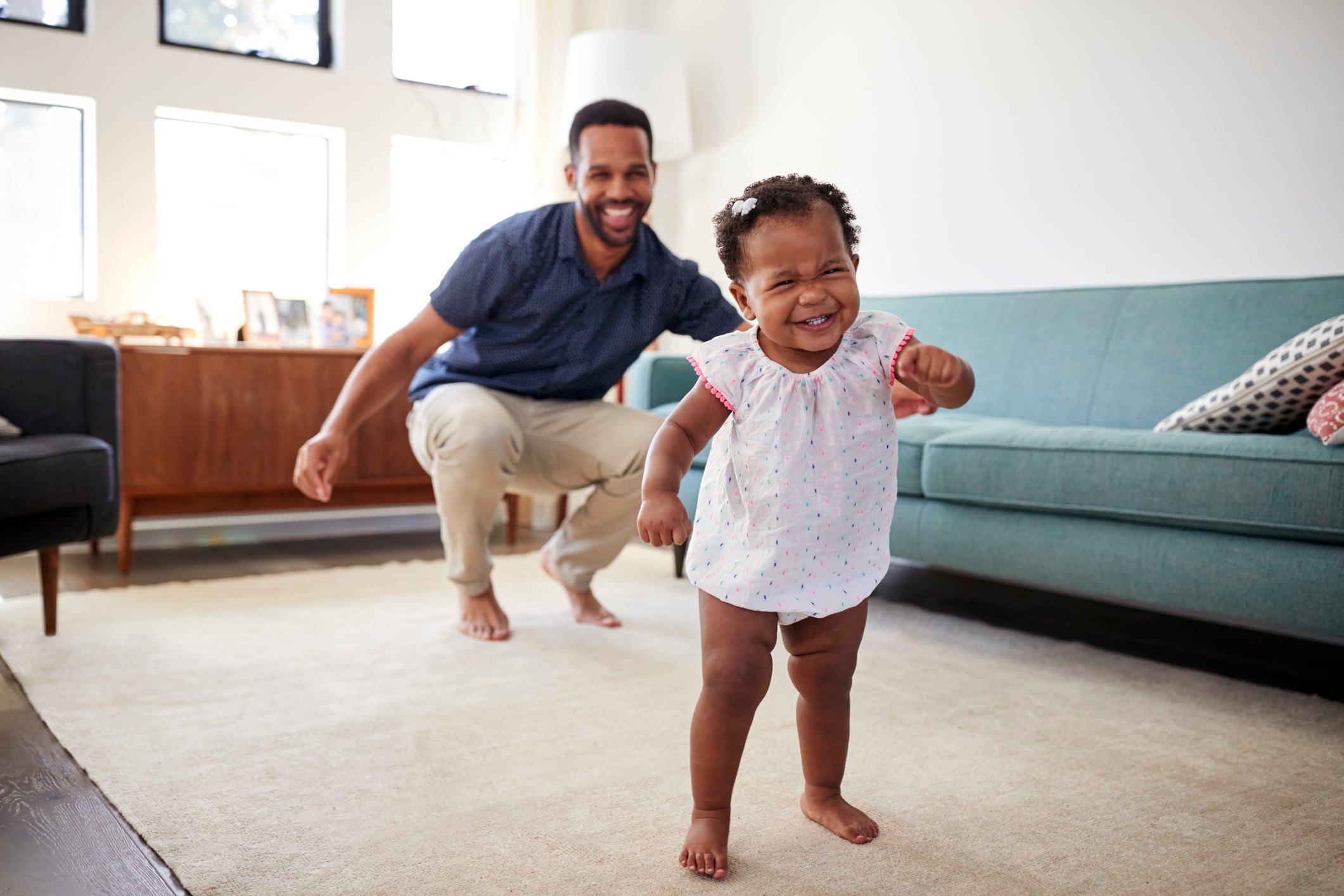When Does a Baby Start Walking?

The average age for a baby to walk unassisted is about 12 months. Still, some babies take their first steps before nine months old, while others don’t reach this milestone until 18 months or older. So how can you tell when your baby is almost ready to walk? And can walking toys help your baby learn to walk at a younger age?
Signs Your Baby will Start Walking Soon
Babies must hit a few milestones before they’re ready to walk. These include:
- Pulling up into a standing position: In an attempt to change their vantage point, babies will grip furniture or hold onto someone to pull themselves up to standing. On average, babies learn this ability about four months before taking their first independent steps.
- Walking with support: At this stage, babies have the strength and coordination to shift their weight from one leg to another. They can walk while holding Mom or Dad’s hands and cruise along the edge of the sofa. Independent walking usually emerges about three months after babies start walking with support.
- Standing unassisted for several seconds: Many babies start walking within two to three months of standing on their own. But some will enthusiastically try and try again, taking their first surefooted steps within just a few days of learning to stand.
- What about crawling? Many parents are surprised to learn that crawling is not a required milestone for walking. In fact, some babies never crawl before they learn to walk.
Can Walking Toys Help Babies Walk Sooner?
Walking toys, also called locomotor toys, are designed to be pushed, pulled, or rolled along the ground. While these toys reward babies with fun sounds or motions as the toy moves, studies show that walking toys don’t motivate babies who aren’t yet walking to take their first steps. However, they do encourage babies who are already on the go to take a few more steps before coming to a halt.
So what about baby walkers? These rigid-framed devices on wheels with a seat suspended in the middle might sound like a shortcut for learning to walk. However, experts warn parents against them. Instead of being a helpful aid, walkers are a counterproductive crutch, encouraging infants to develop abnormal postures and gait patterns that may actually delay independent walking.
When to be Concerned About a Late Walker
A vast majority of children who still aren’t walking after their first birthday go on to develop normally. But if your baby still can’t walk independently by 18 months, it’s time to bring it up with your pediatrician.
Are you ready to welcome a baby into your home, who will eventually take their first wobbly steps with your help? If you had a vasectomy in your younger years, don’t fret—Dr. Joshua Green of the Center for Vasectomy Reversal can help you become a father through safe, effective vasectomy reversal. To learn more about your surgical options, please contact our clinic in Sarasota, FL, by calling 941-894-6428.
Recent Posts
Popular Posts
categories
- Uncategorized
- Sperm Retrieval
- vasectomy reversal
- Emergency
- Dr. Green
- sperm count
- fertility
- male infertility
- MESA
- medical care
- low sperm count
- IVF
- male fertility testing
- anesthesia
- pregnancy
- sperm aspiration
- semen analysis
- post-vasectomy pain syndrome
- infertility
- VE
- anti-sperm antibodies
- older dad
- general anesthesia
- gender reveal party
- post-operative infections
- baby name
- parent
- baby's first year
- fertilization process
- spinal anesthesia
- ACS Fellow
- nutrition tips
- concierge-level care
- fertility planning app
- azoospermia
- out-of-town patients
- V-V
- post-vasectomy reversal
- conceiving
- vasectomy
- vasoepididymostomy
- smoking
- sperm quality
- baby registry
- infographic
- surgical care
- surgical consultation process
- prostate cancer
- baby gender
- family time
- COVID
- Baby Shower
- Child Care
- Halloween Costume Ideas for Babies
- Halloween
- Halloween Safety Tips
- Celebrity Infertility Spotlight
- Postpartum
- testosterone
- Father's Day
- Father
- Men's Health
- Thanksgiving
- Pregnancy Announcement
- Parenting Tips
- Sperm
